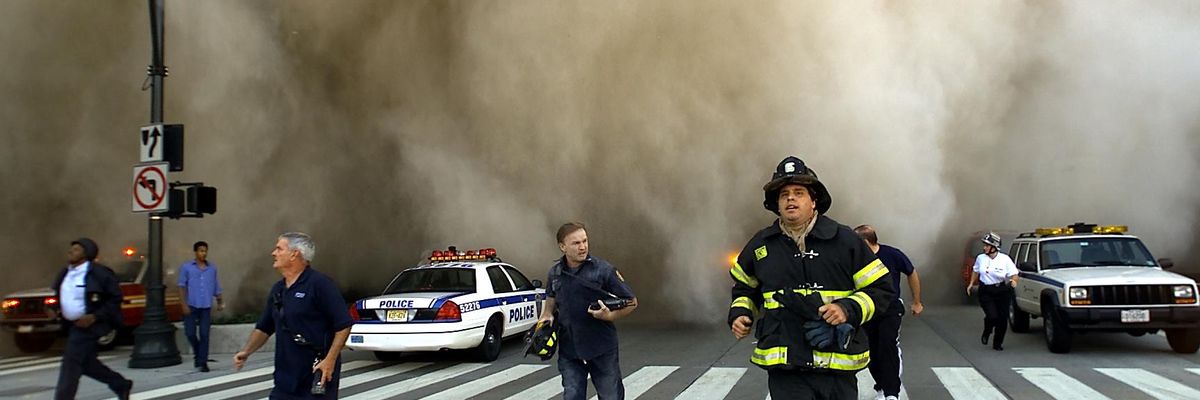A fateful day
I remember vividly the terrible day when our lives--and our world--changed forever. What promised to be a peaceful September morning turned into a nightmare. As usual, that day--a beautiful diaphanous day with a very clear sky--my wife and I woke up about 7 am. We had breakfast and she left for work on Long Island, about 45 minutes from home. I was planning to have a working lunch at the United Nations headquarters.
Experience has shown that violence begets violence and intolerance breeds intolerance.
I was listening to the radio in my apartment, a few blocks from Ground Zero, when the plane hit the first tower. I could hear the cries from the street below, "Oh, no, no, no!" "Oh, my God!" I ran downstairs just in time to see the second tower crumble like a sandcastle. It was 9:59 A.M. I joined others rushing to the spot when a large group of people came running back shouting: "Go back, go back, for God's sake, go back!" We rushed back only to discover later that it was a false alarm--that there would be no more attacks on the towers after the second plane hit. Without fully understanding the significance of events, I felt that a relatively peaceful way of life had been replaced by a darker, more sinister one. A great sadness came over me.
Soon after, we learned the details of what had happened and heard stories and saw pictures of those who had thrown themselves voluntarily to their certain death rather than remain trapped inside an inferno. Richard Drew, who photographed one of the iconic images of that fateful day, the "Falling Man," the lonely image of a man falling to his death with one of the towers in the background said recently that for him it was the image of the Unknown Soldier. An estimated seven percent of those killed in the attack on September 11 did so by jumping into the void from their offices.
We also heard heartbreaking stories about people we knew who were killed that day. One, the son of friends, had just enough time to call his brother and say, "Please tell Mom and Dad that I love them a lot, as I love you," before the line went dead. To this day his parents have not regained their joie de vivre. Or the employee of a large company who had left the Towers, then called his wife to say he was fine after the first tower had been hit, and then returned to retrieve documents from his desk and died when the fire ravaged his office.
Lack of communication
After the second attack on the Towers, I tried to contact my wife at work. It was impossible to communicate by phone with her. I learned, however, that I could call the Borough of Queens, where a medical colleague, Dr. Juan Rivolta lived. I wanted to see if I could communicate with my wife through him. I summarized what had happened. He thought I was joking, but changed his attitude when he heard the desperation in my voice and finally was convinced when I told him to turn on the TV.
Juan was able to communicate with my wife and told me that she was safe. When we spoke later that day, she explained that soon after arriving at her college, someone had called the office so they turned on the TV and were able to witness the horror of the events taking place. Since virtually all roads leading to New York City were closed, my wife stayed at a colleague's house for the next three days.
A life-saving dog
It seems impossible that anyone trapped inside the towers could have survived. Yet that is what happened to 20 people, including some firefighters and police officers and an administrative secretary of the Port Authority, Genelle Guzman-McMillan. As Matthew Shaer tells it in New York magazine, Genelle followed a group of colleagues to the smoke-filled stairway. As they descended, Genelle was certain that she would survive and could go down and meet her boyfriend, as they had planned. However, when the building collapsed, she suddenly lost her balance and was dragged to the ground floor, surrounded by tons of cement and steel. Finally, she stopped and felt something soft and warm under her--it was a dead person. She remained silent for 27 hours, praying and asking God for her life. A German Labrador named Trakr found her.
The shock people experienced as a result of the attacks perhaps mirrored the shock that Americans felt after the Japanese attack on Pearl Harbor. Such was the state of fear that the noise of aircraft crossing the sky was enough to frighten New Yorkers. Such fears led to unexpected reactions. A friend, an art teacher at a university in New York, told me recently, "Although I am a total agnostic, I must confess that after the attacks I felt something strange as if my house had been invaded by ghosts whose steps I seemed to hear at night. I was so frightened that I asked a Buddhist priest to exorcize my apartment and assure me that I was not going crazy."
A final reflection
Will we ever be able to eliminate terrorism? Twenty years after the attack on the World Trade Center Towers, terrorist groups still exist and cast a dark shadow over the world. Experience has shown that violence begets violence and intolerance breeds intolerance. To pretend that military force by itself will solve the problems besieging countries in conflict is a fool's errand. Unless a new approach to preventing terrorist acts is used, we will continue to live under the threat of terror.
